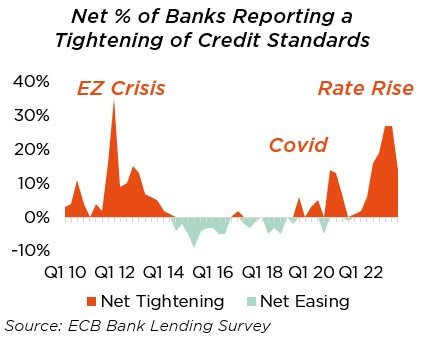5 Do's And Don'ts For Landing A Job In The Private Credit Boom

Table of Contents
Do's: Maximize Your Chances of Success
1. Do Network Strategically
Building a strong network is paramount in the private credit industry. Don't underestimate the power of personal connections.
- LinkedIn Optimization: Ensure your LinkedIn profile is meticulously crafted, highlighting your skills in areas like financial modeling, credit analysis, and portfolio management. Use keywords like "private credit," "alternative lending," and specific strategies (e.g., "distressed debt," "mezzanine financing").
- Industry Events: Attend conferences, webinars, and networking events focused on private credit, alternative lending, and investment management. These events provide opportunities to meet professionals and learn about new job openings.
- Informational Interviews: Reach out to professionals working in private credit firms for informational interviews. This allows you to learn about their experiences, gain insights into the industry, and potentially uncover unadvertised opportunities. Target specific firms known for their expertise in areas that align with your interests. For example, if you're passionate about distressed debt, focus your networking efforts on firms specializing in that area.
- Recruiters: Cultivate relationships with recruiters specializing in private credit placements. They often have access to exclusive job opportunities and can offer valuable advice.
- Alumni Networks: Leverage your alumni network if you have a relevant degree. Many successful professionals are happy to help fellow alumni.
2. Do Highlight Relevant Skills
Your resume and cover letter are your first impression. Make them count.
- Targeted Applications: Tailor your resume and cover letter to each specific job description. Don't use a generic template. Highlight the skills and experiences most relevant to the particular role and company.
- Quantifiable Achievements: Use numbers to showcase your accomplishments. Instead of simply stating "managed a portfolio," say "managed a $50 million portfolio, exceeding performance targets by 10%."
- Technical Skills: Emphasize your proficiency in financial modeling, credit analysis, and portfolio management. Mention specific software you're familiar with, such as Bloomberg Terminal, Argus, and, of course, advanced Excel skills.
- Relevant Experience: Highlight any experience, even from internships or previous roles, that demonstrates your understanding of credit risk assessment, financial statement analysis, and capital structures.
3. Do Showcase Your Understanding of Private Credit
Demonstrate that you're not just applying for any finance job, but that you understand the nuances of the private credit market.
- Deep Understanding: Show a comprehensive understanding of various private credit strategies, including direct lending, mezzanine financing, and distressed debt. Mention specific strategies and their application.
- Industry Awareness: Stay updated on industry trends and news by reading reputable financial publications like the Wall Street Journal, Bloomberg, and industry-specific journals.
- Analytical Skills: Highlight your ability to analyze financial statements, assess credit risk, and understand different capital structures. Include examples where you've done this successfully.
- Certifications and Projects: Mention any relevant coursework, certifications (CFA, CAIA), or personal projects that demonstrate your commitment to the field.
4. Do Prepare Thoroughly for Interviews
Interview preparation is key to success.
- Practice Makes Perfect: Practice your answers to common interview questions, including behavioral questions ("Tell me about a time you failed") and technical questions related to credit analysis and financial modeling.
- Company Research: Research the firm and interviewer thoroughly before the interview. Understand their investment strategies, recent deals, and the interviewer's background.
- Ask Insightful Questions: Prepare insightful questions to ask the interviewer, showing your genuine interest and engagement. Avoid questions easily answered through basic research.
- Confident Communication: Practice your presentation and communication skills to ensure you can confidently articulate your ideas and experiences.
5. Do Follow Up Professionally
Following up is often overlooked but can make a significant difference.
- Thank You Notes: Send a thank-you note to each interviewer within 24 hours, reiterating your interest and highlighting key discussion points.
- Post-Interview Follow-Up: Follow up appropriately after the interview process concludes, even if you haven't heard back within the expected timeframe. A polite and professional inquiry demonstrates your continued interest.
Don'ts: Avoid These Common Mistakes
Avoiding these pitfalls will significantly improve your job search success.
1. Don't Neglect Your Online Presence
Your digital footprint matters.
- LinkedIn Profile: Ensure your LinkedIn profile is up-to-date, professional, and optimized with relevant keywords like "Private Credit," "Credit Analyst," and "Alternative Lending."
- Social Media: Avoid posting anything controversial or unprofessional on social media platforms. Employers often review candidates' social media presence.
2. Don't Submit Generic Applications
Each application should be unique.
- Tailored Applications: Avoid sending the same resume and cover letter to multiple firms. Tailor each application to the specific job requirements and company culture.
3. Don't Underestimate the Importance of Networking
Networking is more than just attending events.
- Proactive Networking: Don’t rely solely on online job boards. Actively network with professionals in the industry to uncover unadvertised opportunities and build valuable relationships.
4. Don't Be Unprepared for Technical Questions
Technical skills are essential in private credit.
- Technical Proficiency: Brush up on your financial modeling skills and practice your ability to analyze financial statements. Be prepared to explain your approach and assumptions clearly and confidently.
5. Don't Neglect the Follow-Up
A simple follow-up can make a difference.
- Professional Follow-Up: A timely and professional follow-up email after the interview process can reinforce your interest and keep you top-of-mind.
Conclusion
Landing a job in the thriving private credit sector requires dedication, preparation, and a strategic approach. By following these do's and don'ts, you can significantly increase your chances of success. Remember to network effectively, tailor your applications, demonstrate your understanding of private credit, prepare thoroughly for interviews, and follow up professionally. Don't miss out on this booming opportunity; begin your private credit job search now! Secure your dream private credit role today by implementing these strategies and showcasing your expertise in the exciting world of alternative lending and investment management.

Featured Posts
-
 Ledra Palace Ta Dijital Isguecue Piyasasi Veri Tabani Tanitimi
May 19, 2025
Ledra Palace Ta Dijital Isguecue Piyasasi Veri Tabani Tanitimi
May 19, 2025 -
 Syntrivi Enatenisis Symvoyles Gia Tin Apofygi Kai Tin Diaxeirisi
May 19, 2025
Syntrivi Enatenisis Symvoyles Gia Tin Apofygi Kai Tin Diaxeirisi
May 19, 2025 -
 Eurovision 2025 Safura Az Rbaycani T Msil Ed C K
May 19, 2025
Eurovision 2025 Safura Az Rbaycani T Msil Ed C K
May 19, 2025 -
 Aspirantes A Diputados Del Movimiento Nueva Corriente Conociendo A Los Candidatos
May 19, 2025
Aspirantes A Diputados Del Movimiento Nueva Corriente Conociendo A Los Candidatos
May 19, 2025 -
 Paige Bueckers Day Long Hometown Map Mystery Explained
May 19, 2025
Paige Bueckers Day Long Hometown Map Mystery Explained
May 19, 2025
